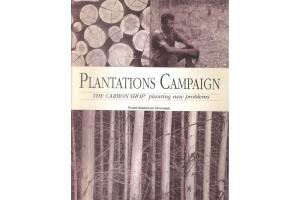In the last issue of the WRM bulletin we included an article --"Argentina: A shady carbon sink project"-- detailing an absurd and destructive tree plantation project in that country. Now we are pleased to inform you that the struggle against it has been successful. The Argentinian justice has prohibited the company to "carry out all the works related to the forestry project", which involved the clearcutting of 4400 hectares of native forest to be substituted with Oregon pine.
Large-Scale Tree Plantations
Industrial tree plantations are large-scale, intensively managed, even-aged monocultures, involving vast areas of fertile land under the control of plantation companies. Management of plantations involves the use of huge amounts of water as well as agrochemicals—which harm humans, and plants and animals in the plantations and surrounding areas.
Bulletin articles
13 December 2000
In order to revamp its deteriorated image, the Chilean forestry sector launched in August the multimillion-dollar campaign “Forests for Chile”, consisting of propaganda in mass media aimed at convincing public opinion about the benefits of what it calls "forests" and which are in fact monoculture tree plantations (see WRM Bulletin 39).
Bulletin articles
13 December 2000
For more than 10 years Uruguay has been implementing an unsustainable forestry model, substituting its natural prairie ecosystems with large-scale eucalyptus and pine tree plantations.
Other information
13 December 2000
One of the major myths about tree plantations is that they help to alleviate pressures on forests by providing alternative wood sources. This has been proven false in practically all southern countries, but the myth still prevails in many circles, particularly among professional foresters. Another major myth is that plantations are "planted forests", having the same positive impacts as forests. This has also proven to be absolutely false, but foresters still insist in calling then "forests."
Bulletin articles
16 November 2000
The Sixth Conference of the Parties of the Convention on Climate Change is finally over and nothing much appears to have been achieved to address global warming. This doesn't come as a surprise, given that the majority of government delegates -- with a few exceptions -- focused more on how to obtain profits for their countries and corporations from the new carbon trade than on finding true solutions to the looming climate disaster.
Bulletin articles
16 November 2000
The draft Forestry Law being discussed by the Gabonese Parliament encourages the industrialization of wood within the country. According to the Ministry for Waters and Forests, the new law will establish more strict rules concerning the exploitation of the country's forests. Concessions to private companies will be granted for a longer period of time, allegedly to favour the regeneration of the forest.
Bulletin articles
16 November 2000
The temporary work permit given to the Kudremukh Iron Ore Company (KIOCL) to continue the extraction of iron in the Kudremukh National Park, located in the Western Ghats region of the state of Karnataka, has given place to severe criticism from national and international environmental NGOs, which had been putting pressure on the authorities for the company's request to be denied.
Bulletin articles
16 November 2000
On 7th November 2000 the formal opening of a US$2.9 million laminated-wood processing factory took place at Nabong Farm, 30 kilometres from Vientiane, the capital of Lao PDR. The factory will initially sell timber pallets to IKEA, the Swedish retailing giant, and in future will produce furniture under the trademark Vicwood. Financing came from a series of loans --US$550,000 from IKEA, US$800,000 from the International Finance Corporation, the private sector arm of the World Bank, and US$300,000 from Swedfund, the Swedish IFC counterpart.
Bulletin articles
16 November 2000
A plantation project that would occupy about 3% of the area of Sabah, in northern Borneo, and provoke the clearcutting of 6% of its dwindling primary forests is being promoted in Kalabakan by a joint-venture between the State-owned company Innoprise Corporation Sdn Bhd, Lions Group of Malaysia and the China Fuxing Pulp and Paper Industries of China.
Bulletin articles
16 November 2000
A new type of forest conservation initiative is being implemented in Guatemala since 1995. According to its promoters, it attempts to couple community-based sustainable development with the protection of the Petén forests in the multiple use zone of the Maya Biosphere Reserve, the largest protected area in Central America.
Bulletin articles
16 November 2000
While government representatives were discussing at the Hague the supposed benefits of including forests and plantations in the so-called Clean Development Mechanism of the Kyoto Protocol of the Climate Change Convention, an unusual project in Argentina was giving reason to those opposing such inclusion.

